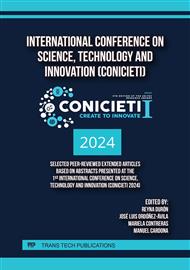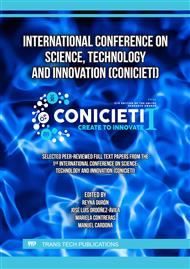[1]
J. A. P. Roas, «Climate risk and definition of financial strategies for its mitigation in the water and sanitation sector in LAC: Methodology for prioritizing and sizing investments in climate change adaptation and mitigation measures», IDB Publ., may 2021.
DOI: 10.18235/0003252
Google Scholar
[2]
V. Ochoa Perdomo, «Self-evaluation of the entrepreneurial profile of a group of university professors of art and design in Honduras», ago. 2022, Last access: 8 de april de 2024. [Online]. Available in: https://laccei.org/LEIRD2022-VirtualEdition/meta/FP205.html
Google Scholar
[3]
G. Y. Rojas et al., «Instrument to Identify Personal and Didactic Characteristics Used by Teachers in the Training of Entrepreneurs», Form. Univ., vol. 12, n.o 2, pp.29-40, abr. 2019.
DOI: 10.4067/S0718-50062019000200029
Google Scholar
[4]
D. George y P. Mallery, SPSS for Windows Step by Step: A Simple Guide and Reference. Allyn and Bacon, 1999.
Google Scholar
[5]
Learn more about our School of Art & Design. | Learn more about our School of Art & Design. Video courtesy of Cromos For more information: http://bit.ly/36Kyc9L | By Unitec Honduras Facebook, (19 de diciembre de 2019). Last access: 8 de april de 2024. [Online Video]. Available in: https://es-es.facebook.com/unitec.honduras/videos/conoc%C3%A9-un-poco-m%C3% A1s-sobre-nuestra-escuela-de-arte-y-dise%C3%B1o/1132236450501331/
Google Scholar
[6]
A. G. González, M. D. García-González, y M. A. Agudelo-Giraldo, « Training enterprising engineers», Rev. Educ. En Ing., vol. 14, n.o 27, Art. n.o 27, mar. 2019.
Google Scholar
[7]
E. P. Fernández Manzano y R. Linares Palomar, Pitching strategies for audiovisual workshops and transmedia projects. Editorial UOC, 2014. Last access: 8 de april de 2024. [Online]. Available in: https://dialnet.unirioja.es/servlet/libro?codigo=761715
Google Scholar
[8]
M. Duran, « Proposal to promote entrepreneurship». Last access: 8 de april de 2024. [Online]. Available in: https://issuu.com/elvirabarrera/docs/libropalomadurandv02-130108143401-p
Google Scholar
[9]
M.E. Bello, «Teacher Competencies for Entrepreneurship Training at the Metropolitan University». Department of Didactics Universidad Metropolitana Caracas - Venezuela, 2008. [Online]. Available in: https://www.uv.es/motiva2/Ponencias%20Motiva%202008/ Venezuela_Bello%20Ma.%20Eugenia.pdf
Google Scholar
[10]
S. Del Solar, «Entrepreneurs in the classroom». 2010. [Online]. Available in: https://bibliotecadigital.mineduc.cl/bitstream/handle/20.500.12365/18450/EmprendedoresWEB1.pdf?sequence=1&isAllowed=y
Google Scholar
[11]
A. M. Orti González y J. Clares López, « Training methodologies in entrepreneurship training systems", in Knowledge, innovation and entrepreneurs: the way to the future, 2007, ISBN 84-690-3573-8, La Rioja University, 2007, p.94. Last access: 8 de april de 2024. [Online]. Available in: https://dialnet.unirioja.es/servlet/articulo?codigo=2234321
Google Scholar
[12]
Camara de comercio de Bogotá, « The teacher as a promoter and trainer of entrepreneurship», yumpu.com. Last access: 8 de april de 2024. [Online]. Available in: https://www.yumpu.com/es/document/view/14182053/el-docente-como-promotor-y-formador-del-emprendimiento
Google Scholar
[13]
L. Jaramillo, « Entrepreneurship: Basic concept in competencies», Lumen-Inst. Estud. En Educ., vol. 7, pp.1-6, 2008.
Google Scholar
[14]
J. Pulido Saúl, Acosta, Martha, T. C. Elizabeth, P. V. Roberto, y S. A. Marisol, Didactics to train entrepreneurs. University of Cauca Publishing House, 2017.
Google Scholar
[15]
V. A. Tripodoro y G. G. De Simone, « New paradigms in university education: David Kolb's learning styles», Med. B. Aires, vol. 75, n.o 2, pp.109-112, abr. 2015.
Google Scholar
[16]
A. Kolb y D. Kolb, «Experiential Learning Theory: A Dynamic, Holistic Approach to Management Learning, Education and Development», Armstrong J Fukami C Eds Handb. Manag. Learn. Educ. Dev., abr. 2011.
DOI: 10.4135/9780857021038.n3
Google Scholar
[17]
L. N. R. Agudelo, V. S. Urbina, y F. J. M. Gutiérrez, « Learning styles based on Kolb's model in virtual education. », Apertura, vol. 2, n.o 1, 2010, Last access: 9 de april de 2024. [On line]. Available en: https://www.redalyc.org/articulo.oa?id=68820841007
Google Scholar
[18]
G. M. Sierra Villamil, « Educational leadership in the 21st century, from the perspective of sustainable entrepreneurship», Rev. EAN, n.o 81, pp.111-129, dic. 2016, doi: 10.21158/01208160. n81.2016.1562.
Google Scholar
[19]
G. Asimakopoulos, V. Hernández, y J. Peña Miguel, «Entrepreneurial Intention of Engineering Students: The Role of Social Norms and Entrepreneurial Self-Efficacy», Sustainability, vol. 11, n.o 16, Art. n.o 16, ene. 2019.
DOI: 10.3390/su11164314
Google Scholar
[20]
E. E. Aldana-Rivera, J. Tafur-Castillo, I. Gil, y C. Mejía, « Pedagogical practice of entrepreneurship in higher education teachers at the University Educational Institution of Barranquilla. », Arch. Venez. Farmacol. Ter., vol. 38, n.o 2, pp.9-18, 2019.
Google Scholar
[21]
J. C. Sánchez García et al., "Entrepreneurial Education: State of the Art," Purposes and Representations, vol. 5, no. 2, pp.401-473, 2017.
Google Scholar
[22]
M. C. Huerta, "Evaluation of socio-emotional and transversal skills: a state of the art," Caracas: DIALOGAS, Adelante, Agcid Chile, MESACTS, and CAF, April 9, 2019. Available in: https://scioteca.caf.com/handle/123456789/1419
Google Scholar



